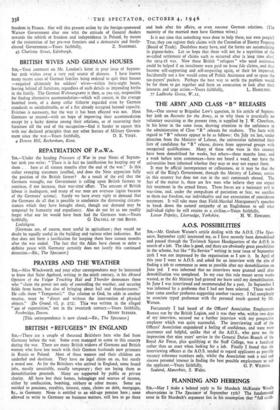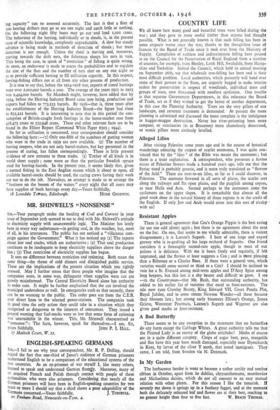PLANNING AND HERRINGS
Snt—May I make a belated reply to Sir Murdoch McKenzie Wood's observations in The Spectator of September 13th? The fundamental error in Sir Murdoch's argument lies in his assumption that "full catch- ing capacity " can be assessed accurately. The fact is that a fleet of Zoo herring drifters may go to sea one night and catch little or nothing. On the following night fifty boats may go out and land ',coo crans. The behaviour of the herring, individually or in shoals, is, in the present state of scientific knowledge, completely unpredictable. A slow but steady advance is being made in methods of detection of shoals ; but mere detection is not enough. Unless the shoal is moving and, moreover, moving towards the drift nets, the fisherman shoqts his nets in vain. This being the case, to speak of " restriction " of fishing is quite wrong. At most, an endeavour is made to assess the probabilities and to regulate the size of the fleet and the number of nets shot on any one night so as to provide sufficient herring to fill utilisation capacity. In this respect, herring-fishing differs not at all from any other process of production.
It is true to say that, before the 1914-1918 war, exports of cured herrings were over 2,000,000 barrels a year. The average of the years 1911 to 1913 was 2,424,000 barrels. Sir Murdoch might, however, have added that by 1934, before the Herring Industry Board came into being, production and exports had fallen CO 773,233 barrels. By 1938—that 15, three years after the establishment of the Herring Industry Board—the figure had risen to 852,222 barrels. It is interesting to note that in this period the con- sumption of British-caught fresh herrings in the home-market rose from 458,473 crans to 532,948 crans. These and other relevant facts are to be found in the Elliott Report (Command White Paper 6503 ; 1944).
So far as utilisation is concerned, your correspondent should consider the following facts :—(t) Only one-fifth of the numbers of gutting women who were in the trade in 1939 are now available. (2) The number of herring coopers, who are not only barrel-makers, but key personnel in the process of curing, has fallen correspondingly. There is little present evidence of new entrants to these trades. (3) Timber of all kinds is in world short supply ; none more so than the particular Swedish spruce used for herring-barrels. In the present year, it seems likely that, given a normal fishing in the East Anglian season which is about to open, all available barrel-stocks should be used, the curing crews having their work cut out to do the job. Nowadays, an attempt is made so to arrange the " business on the bosom of the waters " every night that all users may have supplies of fresh herrings every day.—Yours faithfully,































 Previous page
Previous page